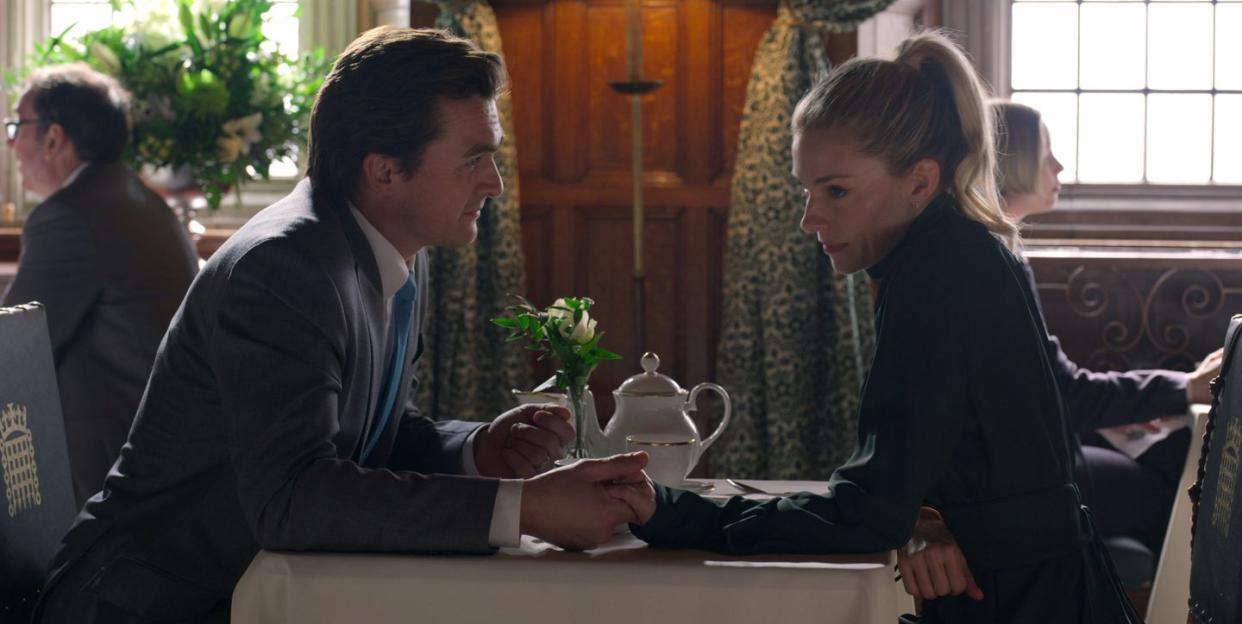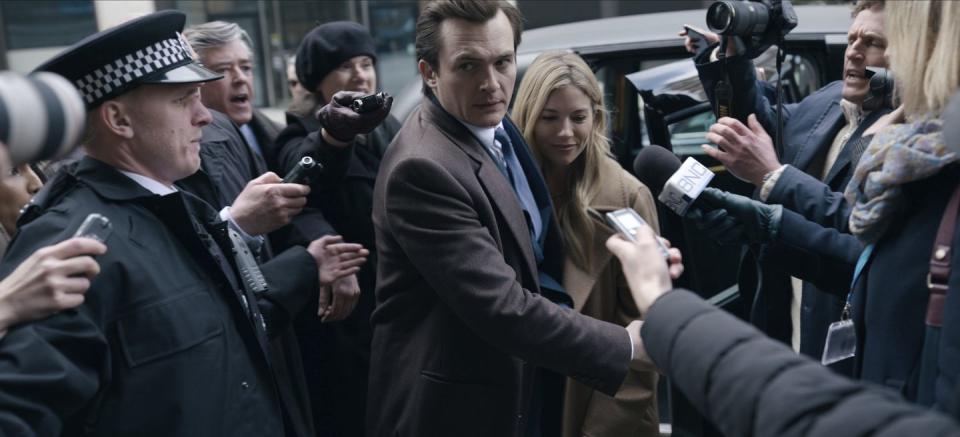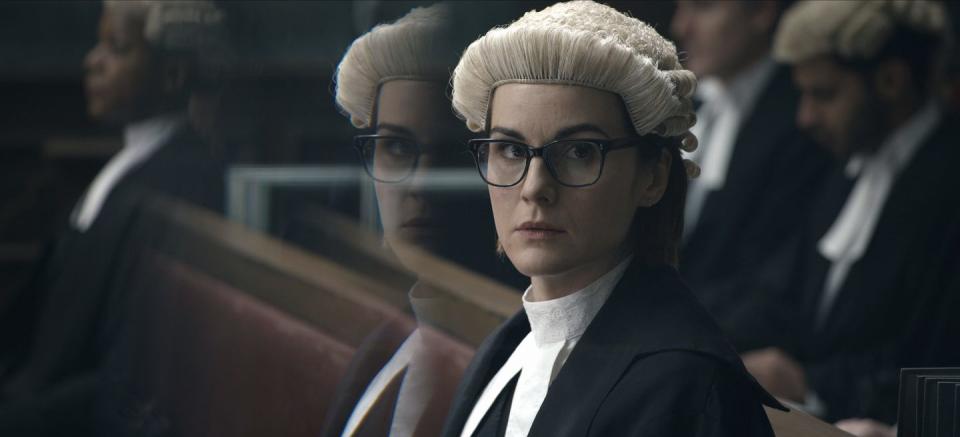What 'Anatomy of a Scandal' tells us about politics today

“It’s really nice of Boris Johnson and the government to be doing so much publicity for us,” says Sarah Vaughan, wryly, when we speak ahead of the release of Anatomy of a Scandal, the much-anticipated Netflix adaptation of her bestselling novel. “Barnard Castle, partygate, that assumption that the current administration can just break the rules so relentlessly… It’s slightly weird how neatly it all fits with the show.”
Vaughan wrote her novel, which narrates the (fictional) case of a married Conservative politician accused of rape by his parliamentary researcher, between January and September 2016. That was the era of the Brexit referendum, when the cracks in the Tory regime were just beginning to be exposed; at the time of the book’s publication two years later, in January 2018, the ‘Pestminster’ scandal had recently broken, triggering a string of high-profile resignations from politicians and a dawning realisation that sexual harassment was endemic within Britain’s corridors of power. Meanwhile, over the pond, the #MeToo movement had been steadily gathering momentum, with at least 100 women coming forward to accuse Harvey Weinstein of sexual misconduct.
No wonder Vaughan has been described as having something of a crystal ball. Her novel’s key themes – both the central issue of consent and broader questions around the reckless behaviour of an overprivileged, predominantly Conservative political elite – chime so perfectly with current affairs that the television adaptation feels as much part of the zeitgeist now as the book did on its publication more than four years ago. “I think the particular sense of entitlement that Anatomy of a Scandal exposes, and that the series captures so well, is one peculiar to wealthy, white men who have been educated at public school and top Russell Group universities – who, in short, have only known a certain kind of privileged lifestyle, and who in their political beliefs are more concerned with the success of the individual than a fairer society for all,” she says. “As long as that continues, this show will continue to be relevant.”

Part of Vaughan’s ability to capture the national mood comes from her journalistic background: she spent 11 years working for The Guardian as a news reporter, health correspondent and political correspondent, regularly observing the intricacies of Westminster life as a member of the Lobby. Though she is at pains to emphasise that her morally dubious protagonist, James Whitehouse, is not in any way modelled on our current Prime Minister (were that the case, she would hardly have wanted an actor as good-looking as Rupert Friend to play him), she does reveal that an early encounter with Boris Johnson inspired aspects of the story. Interviewing him about his affair with The Spectator’s deputy editor Petronella Wyatt, which he had acknowledged only under duress, she was fascinated by his lack of compunction about his previous denials. “He just wasn’t really bothered by the fact that he’d lied, and that was the seed for my book,” explains Vaughan. “For him, the truth was malleable, whereas for most of us, it simply isn’t.”
Johnson is not the only politician to have strayed from the marital bed, and viewers will be able to draw their own parallels, from the David Blunkett affair of the early Noughties to Matt Hancock’s lockdown ‘clinch’ with his aide Gina Coladangelo. What is particularly interesting about the show, however, is its exploration of the impact of such scandals within the home. When I ask Vaughan about some of the people she had in mind while writing the novel, she references Jeffrey Archer’s stalwart wife Mary, Baroness Archer, and David Mellor’s ex-wife Judith Mellor, who was subjected to a series of salacious anecdotes (some later proven to be libellous) about her then-husband’s affair with the actress Antonia de Sancha. “I’ve always been fascinated by political wives who stand by their husbands,” says Vaughan. “When you think about that picture of David Mellor smiling with his family and his in-laws – that his wife was forced to stand there and do that…”

Sienna Miller’s character Sophie is just such a devoted wife to James Whitehouse at the start of the story, agreeing to give him her public support when the news breaks of his affair and maintaining this even when he is accused of rape. But as the trial unfolds in all its graphic detail and she begins to realise that her entire world may have been constructed around falsehoods, we see her veneer of self-assurance gradually stripped away. Seated at the top of the public gallery, she becomes a spectator watching her life play out in front of her, and much of the narrative tension in the show hangs on whether she will find the courage to regain agency over her fate.
The intensely gripping, claustrophobic courtroom scenes are dominated by Michelle Dockery and Naomi Scott as Kate Woodcroft and Olivia Lytton – two psychologically scarred women bringing all their steely strength to bear in their respective roles as prosecutor and victim. “There’s such a performance element to being a barrister – I’m acting a role, but I’m also playing someone who is acting,” says Dockery. “It was about keeping a rhythm to the questions and responses, hiding the moments where Kate might falter, knowing that if she drops the ball or accidentally trips up her client, it could be devastating.” Scott, too, offers a masterclass in the art of self-repression. “I think Olivia really understands the importance of being a ‘good witness’, so there’s an element of
her wanting to contain her emotion, not wanting anyone to see her break,” she says. “But, my gosh, the pressure of having to relay one of the most traumatic moments of her life to convince the jury it’s true.”

The Weinstein resonances are strong here; it would be hard to watch the series and not think of those women testifying under the eye of an international media storm; and, equally, to understand why so many women choose not to come forward after such an experience. In this instance, the complicating factor – as so often in cases of domestic abuse – is the depth of feeling the victim still has for her aggressor; crucially, the affair begins as a consensual relationship. As Scott notes: “It’s the complexity of her being in love with him that makes this such an intense dynamic.”
Friend is suitably charismatic as Whitehouse, allowing us to understand how Olivia could have fallen for him against her better judgement. At the same time, he conjures up his character’s intrinsic sense of amorality brilliantly: this is a man who is ultimately concerned with pursuing his own interests ahead of anyone else’s, no matter how much he might believe he cares about them. “I think that James is so used to getting his own way and having this beautiful life that he hasn’t really questioned himself,” says Friend. “He’s not a particularly examined person, because nobody has said no to him; he’s never had any pushback.” He embarks on the affair without much consideration for the consequences on his home life, and convinces himself that when he formally calls time on the relationship, he can simply return to playing happy families; thus, he seems genuinely shocked when things do not go as planned. As Friend explains: “It’s that arc of someone who ostensibly has it all and thinks they deserve it, and has never really considered anything else… Then there’s that penny-drop moment, that ‘Oh.’”
By allowing Whitehouse to have that moment, through a few brief but well-judged flashes of humanity, Friend is perhaps gentler on his character than Vaughan is in the novel; however, he is clear about the danger that the Whitehouses of this world pose not only to women, but to society as a whole. “When privilege is not acknowledged or respected, it can be an incredibly damaging thing to bestow on someone,” he says. “We see that in very wealthy people who are thrust into the limelight or into positions of great power, and then abuse that power.” The greatest risk comes from the most unrepentant individuals: “It’s those people who get to, say, their seventies and have never looked in the mirror of their own soul, their psychology or morality – now that is a dangerous member of the human race.”

Friend could as well be talking about Vladimir Putin or Donald Trump, and that is precisely the point of this drama: despite its commitment to verisimilitude, its painstakingly accurate portrayal of the workings of British law (the cast worked closely with an experienced criminal barrister throughout filming, as did Vaughan when writing the book), its universal themes will resonate with any audience – and especially with any woman who has ever struggled to be heard. Josette Simon, whose character Angela Regan, a top QC, is tasked with defending Whitehouse, observes that the common thread between the four main female characters is an obligation to hide some aspect of their real selves. “All the women in this narrative are playing a role,” she says. “They’re operating in a world where they have to be self-protective, they have to behave in a certain way, and they’re very good at it – but beneath all of that, they have such pain.” Fittingly, the series was overseen by a women-led team (including the director, SJ Clarkson, and several of the producers), who were perhaps particularly sensitive to the duality inherent in the female experience.
It was women Vaughan had at the front of her mind at the time of writing, and it remains so today. “When I came up with the idea, I was very conscious that I didn’t want my daughter, who had just turned 17, to go through the sorts of things I did from my teens onwards – things I think a lot of women have experienced along the MeToo continuum,” she says. “I hope the show will make people question their behaviour, or at least explore some of these issues. But I also hope it shines a light on the level of entitlement we’re seeing in politics today, which perhaps we haven’t been as conscious of before… and which, for the good of democracy, needs to change.”
‘Anatomy of a Scandal’ is on Netflix from 15 April. This feature originally ran in the May issue of Harper’s Bazaar, on sale now.
You Might Also Like


